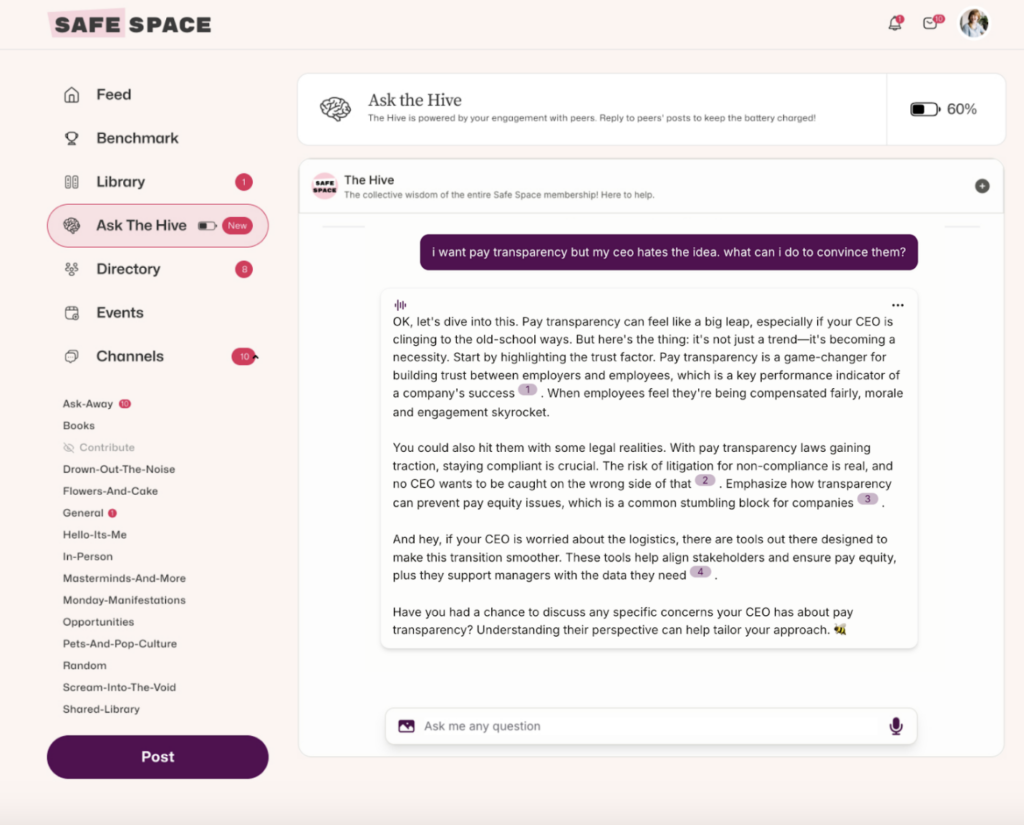
✍🏽 How can employers and managers help create a culture of emotional safety?
Context: I recently was asked to be open and honest with my manager and VP of HR about my role with the organization, but I felt resistant to that idea because it does not feel like a safe environment to share openly and honestly, or even approach them with questions or concerns.
📣 Danielle Maddox, Director of HR @ Amos House:
It’s tough to feel like you can’t share openly about your role or being worried about giving feedback. Start by reflecting on what’s making it feel unsafe – whether it’s past experiences, lack of trust, or uncertainty about how your feedback will be received. Once you’ve pinpointed the issue, decide what feels safe to share and keep the focus on solutions. For instance, instead of diving into everything, you could share one specific challenge and suggest ways leadership could better support you. If even that feels too risky, consider whether there’s someone else, like a trusted colleague or mentor, who could help guide the conversation or act as a bridge. Ultimately, prioritize what you can control: advocating for yourself where possible, and deciding if this organization is the right fit for you long term.
For leaders, if an employee feels it’s unsafe to talk about their role, that’s a sign to reflect. Start by being vulnerable—acknowledge the discomfort and commit to creating a safer space. Build trust through consistent actions, like listening without judgment, respecting confidentiality, and following through on commitments. Regular one-on-one conversations can also help, as they show employees you’re invested in their growth and well-being. Over time, small but intentional steps can shift the culture toward one where employees feel safe to share their experiences openly. Emotional safety doesn’t happen overnight, but showing up with intention goes a long way.
Safe Space members can join this discussion here. Not a member yet? Apply to join here.

✍🏽 How do you feel about rehiring individuals who have previously quit? And hiring individuals related to current employees?
Context: I have worked in large corporations to small business. I personally feel rehiring should very rarely happen. I also feel hiring individuals related to current employees should be more of an exception than a norm, but not as rare as rehiring an employee. I was wondering what an HR professionals feelings are on this.
📣 Leslie Hardin, CHRO @ KC CARE Health Center:
I think the short answer is “it depends.” Typically, there is a reason why someone left the organization. Depending on the organization, if there was a lot of change or growth – it may be appropriate to bring someone back under a different culture. If the person left for a more complex job and several years later wants to come back, then I think that’s appropriate. Typically, if someone is disgruntled and/or leaves for reasons that haven’t changed then I would say no.
📣 Melissa Stough, HR Coordinator @ Project Genesis:
I think both should be on a case-by-case basis with different considerations for both cases.
For rehiring employees, how they left and why they left should be taken into account. An employee may have left on very good terms (may not have even wanted to leave but had to for reasons unrelated to the company) and shouldn’t be barred from rejoining an organization they liked because they chose to leave. My organization has specific policies on how to internally designate if people are eligible for rehire, but even then, we make exceptions if the reason was because they gave a shorter notice that we require or if significant time has passed. Depending on how long it has been since they worked for us, they have to go through the entire hiring process again or we just do an updated background check.
For hiring relatives, who the employee is matters. Individual contributors, so long as they are not working in situations where one could cover up for the other, shouldn’t be an issue. If it’s management, I think that’s where things get tricky no matter what the position the relative applied for. Again, they would still have to go through the same hiring process as everyone else, but it shouldn’t be an out-right ban.
📣 Sharon Hahne, HR Manager @ UW Madison Athletics:
I believe in keeping an open mind when it comes to rehiring individuals who have previously left, as long as they are qualified and left in good standing. People’s circumstances change, and their experiences elsewhere can bring valuable perspectives and skills back to the organization. I say, don’t hate the hustle – if they’re the best fit for the role, why not welcome them back?
JOIN 130K+ HR LEADERS
Get insights, learnings, and advice on how to build companies and cultures that people actually love.
No spam. Unsubscribe any time.
As for hiring individuals related to current employees, I support it as long as the hiring process remains fair and transparent. If they’re qualified and meet the requirements for the position, family connections shouldn’t exclude them from consideration, provided that potential conflicts of interest are appropriately managed.
Safe Space members can join this discussion here. Not a member yet? Apply to join here.


